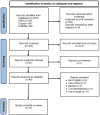Investigating the Challenges and Opportunities of Domiciliary Oral Care for the Older Adults: A Scoping Review
- PMID: 39685091
- PMCID: PMC11641543
- DOI: 10.3390/healthcare12232469
Investigating the Challenges and Opportunities of Domiciliary Oral Care for the Older Adults: A Scoping Review
Abstract
Background/objectives: Older adults need specialised dental care due to age-related changes and chronic conditions, but inadequate coordination and capacity hinder access to domiciliary oral care. This review explores the characteristics, barriers, facilitators, caregiver education, and outcomes of domiciliary oral care to improve services for frail older adults.
Methods: A systematic scoping search was conducted following the PRISMA guidelines. A literature search was performed to identify the key search terms and the databases that were relevant to the objectives. A total of 454 documents were retrieved, 31 of which were included in the final synthesis.
Results: Overall, the barriers and facilitators in delivering domiciliary dental service for the elderly can be categorised into four groups: system, oral healthcare provider, caregiver, and patient. Having policies or guidelines supporting domiciliary oral care was one of the most frequently reported factors. Six studies reported outcomes of educational programme for caregivers and all were with positive results.
Conclusions: The review highlights the need for a multi-pronged approach involving the healthcare system, oral healthcare providers, caregivers, and older adults themselves to improve access to and quality of oral healthcare services for this vulnerable population.
Keywords: caregiver; domiciliary care; elderly; oral health.
Conflict of interest statement
The authors declare no conflicts of interest.
Figures
References
-
- WHO . In: Ageing and Health. Steverson M., editor. World Health Organization; Geneva, Switzerland: 2024. [(accessed on 1st October 2024)]. Available online: https://www.who.int/news-room/fact-sheets/detail/ageing-and-health.
Publication types
Grants and funding
LinkOut - more resources
Full Text Sources


